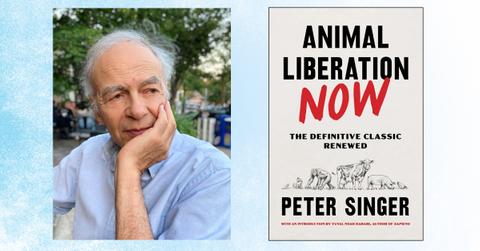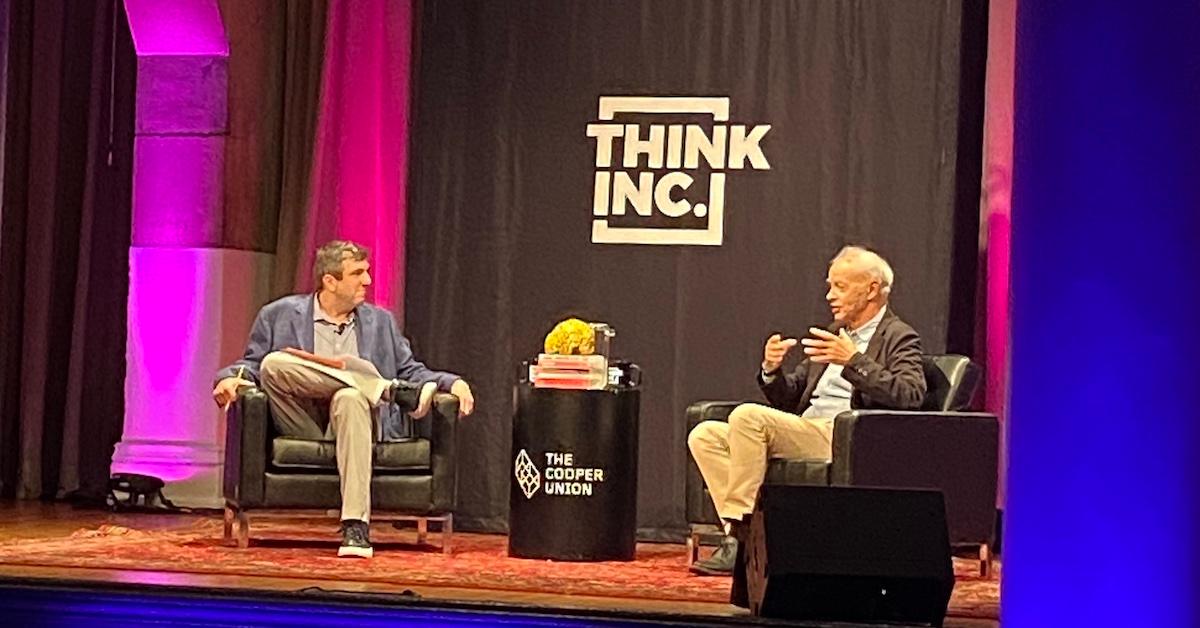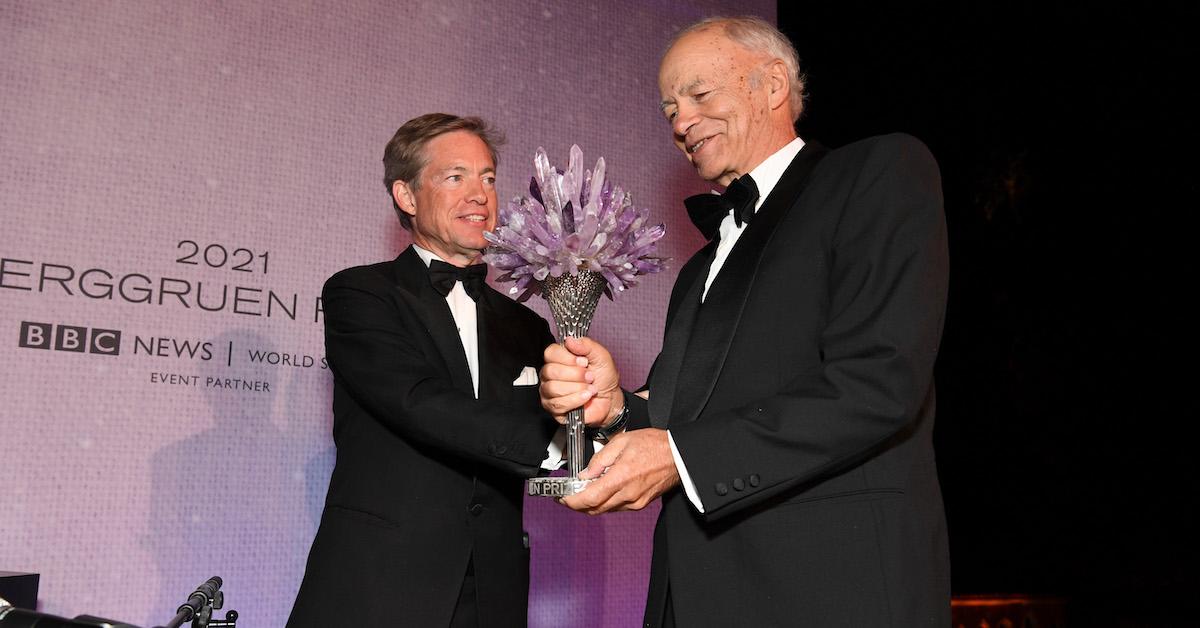Peter Singer's 'Animal Liberation Now' Adds Climate Change Discourse to His Seminal 1975 Book (Exclusive)
Published June 8 2023, 3:49 p.m. ET

Moral philosopher and author Peter Singer has released a revised version of his seminal 1975 book ’Animal Liberation.'
If you have studied moral philosophy sometime in the last few decades, or if you are involved in the animal rights movement, you're probably familiar with Peter Singer. The moral philosopher, Princeton University bioethics professor, and author is perhaps best known for his seminal 1975 book Animal Liberation: The Definitive Classic of the Animal Movement.
The book uncovered the truth of what goes on in factory farms and animal testing labs, and is often credited with helping kick off the animal rights movement. So in 2023, nearly five decades years after the book first hit shelves, Singer has published a revised version, titled Animal Liberation Now.
Peter Singer's 'Animal Liberation Now' revises a classic book on animal rights.
Green Matters attended Singer's talk at the Cooper Union in Manhattan on June 1, 2023, and we spoke with him ahead of the event to learn more about his reasoning behind revising the book.
"I want the book to continue to be relevant in the 21st century, and it was getting dated," Singer tells Green Matters exclusively, adding that the last significant update was made in 1990.

A.J. Jacobs moderated a discussion with Peter Singer at the Cooper Union on June 1, 2023.
The major puzzle piece that has been missing from the book over the past 48 years is, of course, the climate crisis. — something that
It's no coincidence that as the factory farming industry has expanded over the last few decades, climate change has only gotten worse — and Animal Liberation Now makes that connection very clear.
Additionally, the revised book touches on the connection between animal agriculture and COVID-19, assesses the progress made by the vegan movement, and includes plant-based recipes and alternatives for those who want to stop supporting the unjust animal agriculture industry.
And like the original 1975 book, the new edition will hopefully awaken millions more readers to the horrors of factory farming, and motivate them to make a change.
Like any other moral philosopher, Peter Singer has drummed up controversy for a few of his beliefs.
Most significantly, there's the fact that, despite dedicating his career to fighting for animal rights and inspiring people to go vegan, Singer isn't 100 percent vegan himself.
As he explained during the event at the Cooper Union, he and his wife keep a fully vegan home; however, when traveling, he'll occasionally eat bivalves (such as oysters and mussels), dairy products, or eggs.
Though some vegans have admonished Singer for this, Singer maintains that his 99-percent vegan lifestyle has the potential to inspire more people to go try going vegan, without the fear of "messing up."
Singer also has some contentious beliefs regarding voluntary euthanasia.
No matter how one feels about some of Singer's views, there's no denying that he has contributed immensely to the animal rights movement.
Read on for our full interview with Singer.
This interview has been lightly edited and condensed for length and clarity.

Philanthropist, investor, and billionaire Nicolas Berggruen and Peter Singer are seen onstage during The Berggruen Prize Gala Celebrates 2021 Laureate Peter Singer at the Berggruen Hearst Estate in Beverly Hills on May 4, 2022.
GREEN MATTERS: What inspired you to update Animal Liberation with a new edition?
PETER SINGER: There's been a lot of developments in factory farming. Unfortunately, it's expanded, particularly in China. The chickens have been bred to grow even faster, which causes them a lot of welfare problems, because the immature leg bones can't really support the enormous weight that they have, at 6 weeks of age when they're killed.
Animal experimentation, as well. I also wanted to include climate change, which was not a big issue when I last revised it.
And I wanted to talk about some of the progress that we have made on the positive side for the animal movement and growth of veganism.
GM: What was the most interesting thing you discovered when updating the book?
PS: I'm excited about the progress that veganism has made, and the greater availability of plant-based foods. I'm excited about the possibility of cellular production of meat.
On the negative, there's a lot more about fish in the new edition, and that's partly because I thought people may now be readier to have some empathy for fish than they would have been in the '70s. The factory farming of fish — euphemistically called aquaculture — is such a vast industry now. The majority of the vertebrate animals we raise for food now are fish, and we're doing that in horrendous conditions. And of course, generally, there's no humane slaughter for fish, either.
GM: What are your critiques of the climate movement? What would you like to see change?
PS: I would like to see more emphasis on food, and particularly animal food production, as a contribution to climate change. At the policy level, I think a lot of people are aware that producing meat is a major contributor to climate change — I think people don't think enough about how easy this would be to end. We don't need new technologies. We don't need to rebuild the power grid. All we need to do is stop eating animals.
GM: What about in the animal rights movement?
PS: I'd like to stop the infighting between different people.
I want to get as many people on our side as I can. I think it's important to get opposition to factory farming into the mainstream. And to me, factory farming is the big enemy to be fought. And if we can't, people who still eat modest amounts of meat, and are really conscientious about trying to check on the conditions in which the animals are kept — if we count them as allies in the fight against factory farming, that seems to me more productive than saying "no, you're just as bad."
GM: What's your your realistic vision for the future of the world?
PS: Realistically, I think people in 100 years will still be suffering the effects of our failure to control our greenhouse gas emissions now. I can't see that we're going to get that under control within a century.
Unless there's really some amazing technology that can correct this, I think people will be suffering from that in 100 years.
As far as animals concerned, I do think it's possible that we will have stopped eating animals in 100 years. They will have so many alternatives, I think it's possible that they will succeed and produce all the products we need. And even those who are not persuaded by the ethical arguments, will say "Sure, this is good, tastes good, it's cheaper. Why not go for it?"